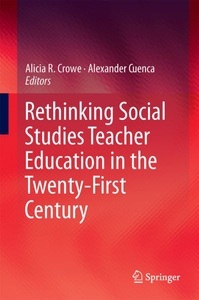Introduction: What are we teaching social studies (teachers) for? Alicia Crowe, Kent State University, Alexander Cuenca, Saint Louis University.- Section 1: Rethinking Social Studies Teacher Education Purposes.- Section 1 Introduction, Crowe and Cuenca.- Chapter 1: From Non-Racism to Anti-Racism in Social Studies Teacher Education: Social Studies and Racial Pedagogical Content Knowledge, LaGarrett J. King, Clemson University, Prentice T. Chandler, University of Cincinnati.- Chapter 2: Challenging Neoliberal Perspectives: A Framework for Humanizing Social Studies Teacher Education, Brooke Blevins, Baylor University, Tony L. Talbert, Baylor University.- Chapter 3: Teaching Social Studies to These Students in This Place: Exploring Place in Social Studies Teacher Education, Whitney G. Blankenship, Rhode Island College, Michelle Reidel, Georgia Southern University, Caroline C. Sullivan, Georgia State University.- Section 2: Rethinking Course Curriculum.- Section 2 Introduction.- Chapter 4: No More Playing in the Dark: Twenty-first Century Citizenship, Critical Race Theory, and the Future of the Social Studies Methods Course, Patricia L. Marshall, Meghan M. Manfra, Crystal G. Simmons, North Carolina State University.- Chapter 5: Preparing Elementary Pre-Service Teachers to Promote Big Ideas Within Social Studies, Sarah Brooks, Millersville University, Dan Jares, Elmhurst College.- Chapter 6: Rooting the Literacies of Citizenship: Ideas that Integrate Social Studies and Language Arts in the Cultivation of a New Global Mindset, Debra D. Shulsky, Elaine Y. Hendrix, University of Houston-Clear Lake.- Section 3: Rethinking Campus Connections.- Section 3 Introduction.- Chapter 7: Working Together, Not Sharing the Burden: A Collaborative Approach to Developing Pedagogical Content Knowledge with Secondary Social Studies Pre-Service Teachers, Wayne Journell, University of North Carolina-Greensboro, Lisa C. Tolbert, University of North Carolina-Greensboro.- Chapter 8: Six Credit Hours For Arizona, The United States, and The World: A Case Study of Teacher Content-Knowledge Preparation and the Creation of Social Studies Courses, Laura Turchi, University of Houston, Elizabeth Hinde, Arizona State University, Ronald I. Dorn, Arizona State University, Gale Ekiss, Arizona Geographic Alliance .- Chapter 9: Overcoming Problems of Marginalization by Reimagining Elementary Social Studies Programs, Annie Whitlock, University of Michigan-Flint, Kristy Brugar, University of Oklahoma, Anne Lise-Halvorsen, Michigan State University.- Chapter 10: Collaboration in Social Studies Teacher Education: Crossing (Disciplinary) Lines, Margaret Weiss, George Mason University, Anthony Pellegrino, George Mason University.- Chapter 11: "As long as I see you on Facebook I know you are safe": Social Media Experiences as Pedagogy, Daniel G. Krutka, Texas Women's University, Kenneth T. Carano, Western Oregon University.- Section 4: Rethinking School Relationships.- Section 4 Introduction.-Chapter 12: Reciprocity and Relationship: Urban Teacher Preparation Through Partnership, Jehanne Beaton, University of Minnesota, J. B. Mayo, Jr. University of Minnesota.- Chapter 13: Expanding Civic Worldviews: Teaching for Citizenship in an Alternative School Setting, Antonio J. Castro, University of Missouri, Kari Muente, University of Missouri.- Chapter 14: Learning In and Through Practice: A Case Study of a Design-Based Residency Program, Andrew L. Hostetler, Vanderbilt University.- Section 5: Rethinking Community Connections.- Section 5 Introduction.- Chapter 15: Intersections of Culture and Community: Developing a Critical Sense of Place in Social Studies Teacher Education, Jason Harshman, University of Iowa.- Chapter 16: Examining Community with Pre-service Teachers through the Use of Participatory Photography Projects, Sarah Mathews, Florida International University, Erin Crews Adams, University of Georgia.- Chapter 17: Place-Based Social Studies Teacher Education: Learning to... Mehr





 Preis-Alarm
Preis-Alarm



















